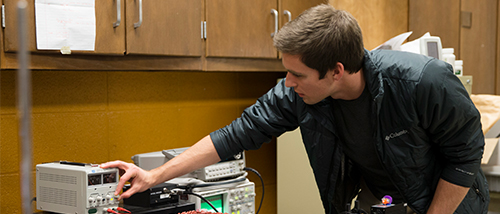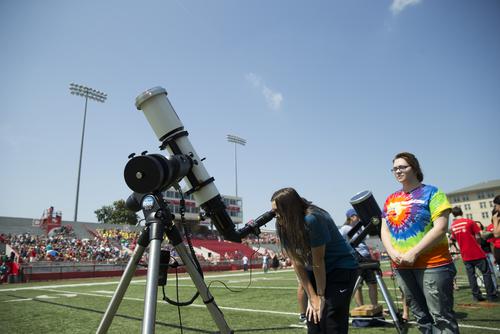Physics
Continue to main content
Outcomes & Careers
-
$166k
Physicists
According to the Bureau of Labor Statistics, the mean annual salary for a physicist is $166,000.
-
$134k
Astronomers
According to the Bureau of Labor Statistics, the mean annual salary for an astronomer is $134,430.
-
$115k
Biophysicist
According to the Bureau of Labor Statistics, the mean annual salary for a biophysicist is $115,570.
As a physics major, you’ll be involved with research from day one because doing is the best learning. You’ll also complete a minimum of 120 credit hours to complete this degree, including the general education requirements and at least 39 senior division hours. A minor is required.
“Critical Courses” are italicized and bolded. Data shows that students who have completed this course in the first two years and have earned the noted grade are most likely to complete this program of study.
A grade of ‘C’ or better is required in each course that is a prerequisite course.
Required Courses:
- CH195 Chemistry Seminar I (1)
- CH295 Chemistry Seminar II (2)
- PH230/030 General Physics I (5)
- PH231/031 General Physics II (5)
- PH345 Experimental Methods I (3)
- PH360 Modern Physics (3)
- PH370 Mechanics (3)
- PH371 Electromagnetics (3)
- PH477 Physics Seminar (1)
- PH478 Undergraduate Research (1)
- PH479 Undergraduate Research (2)
Choose one advising track:
General Physics
- PH473 Quantum Mechanics (3)
- PH570 Mathematical Physics (3)
- XX xxx Technical Electives(300-599) (12)*
Pre-Medical Physics
- BI173/072 Cell and Organismal Biology (3)
- BS113/013 Anatomy & Physiology I (4)
- BS114/014 Anatomy & Physiology II (4)
- CH341 Foundations of Organic Chemistry (4)
- CH342 Organic Chemistry Lab I (1)
- Physics elective (300-599) (3)
- XXxxx Technical Electives (300-599) (9)*
Computational Physics
- CS155 Computer Science I (4)
- CS265 Computer Science II (4)
- CS300 Computer Science III (3)
- CS351 C & the Posix Environment (4)
- PH473 Quantum Mechanics (3)
- PH570 Mathematical Physics (3)
- XXxxx Technical electives (300-599) (6)*
*Choose from BI/BS/CH/CS/EP/EV/ET/NA/NB/PH 300-599 with the advice of an advisor.
Additional Requirements: 30 Hours
- CH184 General Chemistry I Lab (1)
- CH185 General Chemistry I (3)
- CH186 General Chemistry II (3)
- CH187 General Chemistry II Lab (1)
- CS101 Introduction to Computer Programming (3)
- MA140 Analytic Geometry and Calculus I (5)
- MA145 Analytic Geometry and Calculus II (4)
- MA244 Analytic Geometry and Calculus III (4)
- MA345 Linear Algebra (3)
- MA350 Differential Equations (3)
- Social and Behavioral Sciences – 6 hours
- Constitution Requirement – 3 hours
- Written Communication – 6 hours
- Oral Communication – 3 hours
- Natural Sciences – 7 hours (from two disciplines, one to include a lab)
- Mathematics – 3 hours
- Humanities & Fine Arts – 9 hours (from at least two disciplines)
- Additional requirements – 5 hours (to include UI100 for native students)
- Civics examination
First Year
Fall Semester (16 Hours)
- UI100 (1)
- CH184 (1)
- CH185 (3)
- CS101 (3)
- MA140 (5)
- General Education (3)
Spring Semester (14 Hours)
- CH186 (3)
- CH187 (1)
- CH195 (1)
- MA145 (4)
- PH230/030 (5)
Milestone: Maintain 2.0 cumulative GPA
Second Year
Fall Semester (15-16 Hours)
- MA244 (4)
- PH231/031 (5)
- Track course (3-4)
- General Education (3)
Spring Semester (14 Hours)
- CH295 (2)
- MA345 (3)
- MA350 (3)
- PH360 (3)
- General Education (3)
Milestone: Maintain 2.0 cumulative GPA
Third Year
Fall Semester (15-16 Hours)
- PH345 (3)
- PH370 (3)
- Track Course (3-4)
- General Education (3)
- General Education (3)
Spring Semester (14-18 Hours)
- PH371 (3)
- PH478 (1)
- Track Course (3-4)
- Track Course or Elective (2-4)
- General Education (3)
- Elective (2-3)
Milestone: Maintain 2.0 cumulative GPA
Fourth Year
Fall Semester (16-18 Hours)
- PH477 (1)
- PH479 (2)
- Track Course (3-4)
- Track Course (3-4)
- General Education (3)
- Elective (4)
Spring Semester (13-17 Hours)
- Track Course (3-4)
- Track Course or Elective (2-4)
- General Education (3)
- General Education (3)
- Elective (3)
Milestone: Maintain 2.0 cumulative GPA
A “Milestone” signifies a significant stage for a student in the completion of a degree.
What will it cost?
Become a Redhawk.
Do more than dream about the future. Take the first steps to make it all happen.
Alumnus
"I really enjoyed how personable and engaging the Southeast faculty are. Dr. Jonathan Kessler (assistant professor of physics) always had time for thought-provoking conversations. His level of dedication made classes more engaging and enjoyable."
Jesse Hankins

Solar Eclipse
Southeast began its fall 2017 semester with a total solar eclipse, and Southeast’s physics students were part of a team participating in the Citizen Continental America Telescopic Eclipse (CATE) project to take images and video of the inner solar corona. Southeast has already begun work in planning for the next eclipse in 2024!
Department of Chemistry and Physics
One University Plaza, MS 6400
Cape Girardeau, MO 63701

